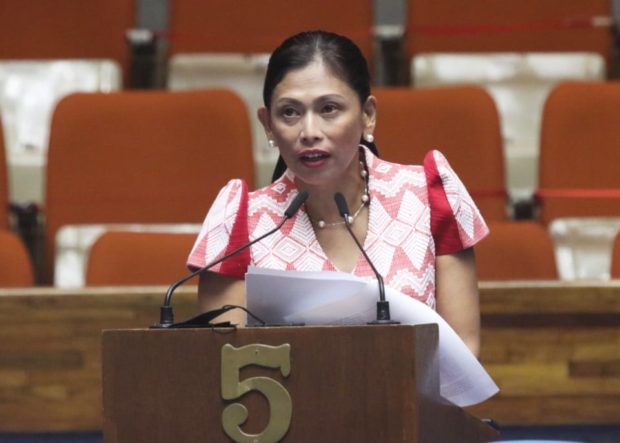
FILE PHOTO: Marikina 2nd District Rep. Stella Quimbo delivers a privilege speech on Monday, November 16, 2020, at the House of Representatives. (File) Photo from the House of Representatives
MANILA, Philippines — Teachers should also be prioritized in getting COVID-19 vaccine booster shots as they encounter students who mostly remain unvaccinated as of now, Marikina 2nd District Rep. Stella Quimbo said on Monday.
Quimbo delivered a privilege speech before the House plenary to urge the Department of Health (DOH) to put teachers at a higher priority for booster shots, saying they are the only industry that regularly interacts with mostly unvaccinated individuals.
“I will file a House resolution to urge the Department of Health to prioritize teachers for booster shots. This will add an extra layer of protection for teachers as they physically report in schools and teach face-to-face classes,” she said.
“Nagawa na po nating kumbinsihin ang executive this year na itaas ang priority ng teachers sa vaccination (We have been able to convince the executive this year to put teachers in a higher priority group for vaccinations). For sure, they will listen to our pleas to prioritize teachers for booster doses as well,” she added.
According to Quimbo, numbers from the Department of Education (DepEd) have shown that only 0.14 percent of minors aged 12-17 have been fully vaccinated, despite the country starting to vaccinate this age bracket in November.
In terms of teachers and other school personnel, DepEd said that 50.33 percent are fully vaccinated.
“They are the only worker group whose job is to physically work with non-vaccinated individuals […] Ang problema po, malaking porsyento ng mga bata ay hindi pa bakunado (The problem is a huge percentage of children are unvaccinated) the youngest age for COVID-19 vaccinations in the Philippines is 12 years old,” she explained.
“Last month we opened face-to-face classes for senior high school students as well as kindergarten to Grade 3 pupils, they are just about five to nine years old kaya siguradong wala pa silang bakuna. So kahit na bakunado na po ang mga guro, at risk pa rin sila dahil wala pang bakuna ang mga estudyante nila,” she added.
(Last month we opened face-to-face classes for senior high school students as well as kindergarten to Grade 3 pupils, they are just about five to nine years old so surely, they have not gotten any COVID-19 vaccine shots. So even if teachers are vaccinated, they are at risk because their students are not yet immunized.)
But aside from this, Quimbo said that they have heard reports of teachers being asked to sign waivers — that the school administration is not responsible for them should they get sick or contract COVID-19,
“Another problem arises when the teacher gets sick because of their line of work, we all know COVID-19 vaccines do not make us fully-immune from the virus, especially now that it is mutating. Teachers doing face-to-face classes are at a higher risk of contracting COVID-19, however, teachers report that some schools require them to sign a waiver,” she said.
“Ayon sa waiver, walang pananagutan ang DepEd kung magkakasakit o magkaroon man ng COVID ang teacher kaya kung magka-COVID because of work ang isang guro, mag-isa na lang po niya itong proproblemahin,” she added.
(According to the waiver, DepEd has no liability or responsibility should a teacher get sick or contract COVID-19 because of work, which means they would have to should the problem on their own.)
Such practices, Quimbo said, should not be required by schools.
A limited face-to-face classes scheme, where students attend schools in-person after almost two years since schools were disrupted by the pandemic, started last November 15 in 100 pilot schools.
READ: Thousands of kids back in public schools for limited in-person classes
READ: DepEd identifies 100 public schools for pilot of face-to-face classes on Nov. 15
The decision to start classes in 100 schools came as the COVID-19 infections in the country took a dive, after record-high infections during the August to September surge. But despite the lower numbers, there were groups who felt that schools were not yet prepared to handle classes amid the pandemic.
So far though, DepEd said that it has not recorded any untoward incident like infections within schools after face-to-face classes resumed — prompting the department to pursue an expanded scheme by 2022.
READ: DepEd: No reported COVID-19 case, so far, in pilot face-to-face classes
READ: DepEd says expansion of face-to-face classes to push through next year